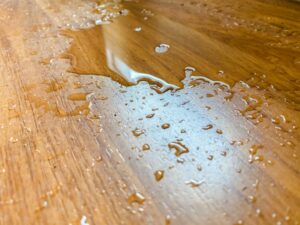If you listen to your air conditioning system when it’s running, you’ll occasionally hear the sound of water dripping. That’s not because your air conditioner uses water to run. The way it cools the air is with refrigerant, which draws heat from inside the house and then transports it outside. The water is a byproduct of this process—and sometimes it may leak from the AC.
If you see water pooling around the indoor air conditioner, please don’t just mop it up and ignore it. That leaking water is a sign of a problem with the AC that can quickly get worse and lead to the system shutting down, so it’s best to call for us for AC repair in Minneapolis, MN.
Below, we’ll take a look at why water leaks can occur and what they mean.
Condensate Moisture
The water in an air conditioner is condensate moisture that forms along the indoor evaporator coil. As the cold refrigerant inside the coil absorbs heat, it causes water vapor in the air to condense on the coil’s surface. It’s the same as when water moisture forms on the outside of a glass with a cold drink in it.
This water has to go somewhere. When it drips off the coil, it falls down into a pan that’s set below the evaporator coil. From there, a pump pulls the water down a drain and through a line leading to the outside where it drips out. This is the condensate drainage system for the AC, and when it’s working, you don’t need to worry about the water in the AC.
But when it doesn’t…
Problems With the Condensate Drainage System
There are several ways that problems with the condensate drainage system can occur that will cause water to leak from the AC:
- Cracked pan: The condensate pan is made from plastic, and it can crack over time. If this happens, water will drip through the cracks and out of the AC.
- Clogged drain: Algal growths inside the drain will stop water from flowing. Because the condensate pan is so shallow (about 1” deep), water will quickly overflow and start to leak from the AC. The drain line can also become clogged.
- Broken pump: The condensate pump runs on a small motor, and if this motor burns out, it won’t be able to effectively remove water from the pan, again leading to the pan overflowing.
- Detached drain: If corrosion affects the condensate drain, it may break away from the bottom of the pan and allow water to leak through the gap left behind.
- Thawing evaporator coil: If the evaporator coil freezes over (a major problem on its own), it may overflow the pan once it is thawed off. This is one of the reasons we recommend calling professionals to deal with a frozen coil.
Water leaks can become a big problem for an air conditioner, leading to the growth of mold and mildew inside the unit. An overflowing condensate pan may also trip the AC’s limit switch, which will cause the system to turn off. Please call our technicians to help fix your leaky air conditioner as soon as you notice the problem.
Contact Residential Heating and Air Conditioning and “Feel the Difference”!

